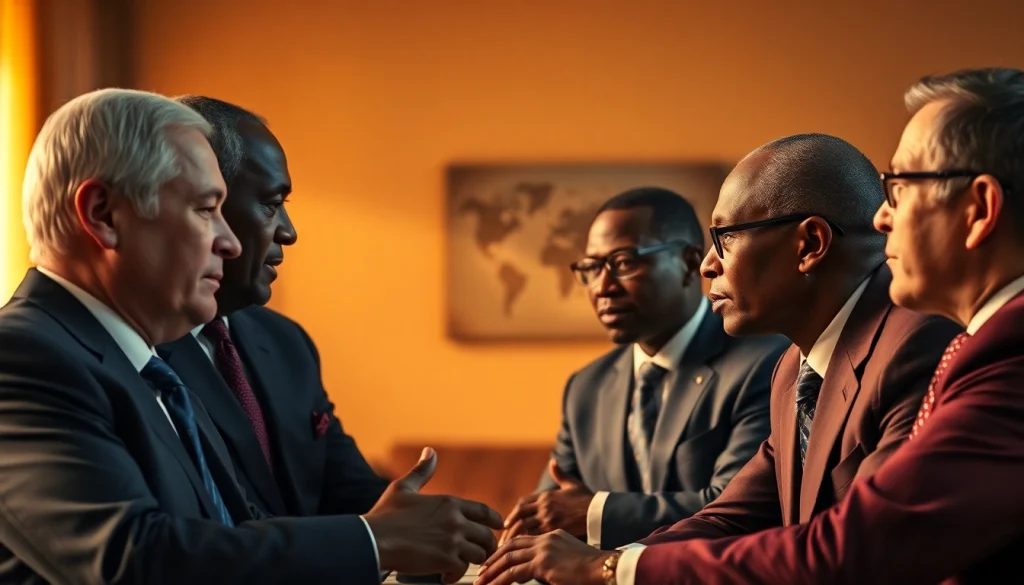Understanding the Landscape of Africa-Russia Relations
Historical Context of Africa-Russia Interactions
The relationship between African countries and Russia has a rich historical background that dates back to the days of the Soviet Union. During the Cold War, Moscow provided significant military and economic support to various African nations seeking to rid themselves of colonial rule and assert their independence. The push for socialist governance paradigms and anti-imperialist sentiments deepened ties, allowing Russia to cultivate strong alliances, particularly with nations such as Angola, Ethiopia, and Cuba. These interactions laid the groundwork for the foundation of what would evolve into modern Africa-Russia relations.
Key Players in the Current Political Climate
Today, the dynamic between Africa and Russia continues to evolve, particularly with key players such as President Vladimir Putin leading formal engagements. His administration focuses on strengthening economic ties, enhancing military cooperation, and promoting cultural exchanges. Key events like the Russia-Africa Summit held in Sochi in 2019 marked a significant moment, with over 50 African leaders in attendance, showcasing Russia’s commitment to re-establish its position in the continent. Additionally, companies like Rosneft and Alrosa are increasingly involved in African economies, which signals Moscow’s ambitions beyond political allegiances to include economic partnerships.
Impact of Global Influences on Media Coverage
Indeed, the media plays a crucial role in portraying the complexities of Africa-Russia relations. Global narratives often highlight Western perspectives, sometimes overshadowing the multifaceted relationships developing outside of Western hegemony. The rise of platforms focused on média Afrique Russie is pivotal in reshaping these narratives, giving voice to African perspectives, and reflecting on how these historical ties are perceived anew in today’s geopolitical landscape.
The Role of Media in Africa-Russia Diplomacy
How média Afrique Russie Influences Public Opinion
Media outlets focusing on Africa-Russia relations serve as crucial channels for information dissemination, helping to shape public opinion. The emphasis on diverse narratives counterbalances the prevailing Western media narratives, allowing for a broader understanding of Russia’s intentions and actions in Africa. This influence extends to social media, where public sentiment can be forged and mobilized to support political and economic collaborations. Understanding how these media outlets operate is essential in deciphering their impact and effectiveness in shaping discourse around Africa-Russia relations.
Case Studies: Successful Media Campaigns
Notably, successful media campaigns that advocate for Africa-Russia cooperation have emerged. For example, initiatives promoting educational exchanges and cultural festivals have been pivotal in breaking down prejudices and fostering mutual understanding. These campaigns often utilize multimedia approaches, including podcasts, online forums, and videos that showcase the shared history and potential for future collaboration between Africa and Russia.
Challenges Faced by Media Outlets in Reporting
Despite their advancements, media outlets face significant challenges, including funding, political pressures, and access to reliable information. Additionally, misconceptions about Russia’s motives often cloud objective reporting. Addressing these challenges requires innovative funding solutions, such as partnerships with international media organizations, and strengthening journalistic integrity through training and capacity building, ensuring that stories reflect the realities on the ground.
Economic Cooperation: Bilateral Trade Agreements
Current Trade Dynamics Between Africa and Russia
Current trade dynamics showcase an expanding economic relationship characterized by increased trade volumes and investment opportunities. In 2022, bilateral trade between Africa and Russia reached approximately USD 18 billion, a significant increase from previous years. Key sectors driving this trade include energy, agriculture, and arms sales, with Russia positioning itself as a critical partner in Africa’s quest for sustainable development.
Strategic Sectors Benefiting from Collaboration
Strategically, sectors such as energy production, mining, and agriculture have benefitted greatly from collaboration between African nations and Russia. Projects involving energy infrastructure, including the construction of power plants and gas pipelines, highlight Russia’s investment in African energy security. The mineral wealth of countries like Nigeria and Angola also attracts Russian investors who recognize the potential benefits of mining agreements that foster mutual economic prosperity.
Future Opportunities for Economic Growth
The prospects for future economic growth in Africa-Russia relations are promising. Opportunities lie in technology transfer and joint ventures, particularly in the realms of renewable energy, agriculture, and digital technologies. Additionally, as African nations pursue industrialization targets under initiatives like the African Continental Free Trade Area (AfCFTA), Russian investments can support these goals. Collaborations in scientific research and innovation will pave the way for sustainable growth and enhanced competitiveness on a global scale.
Cultural Exchange and Its Implications
Cross-Cultural Initiatives Between Africa and Russia
Cultural exchange initiatives play a crucial role in strengthening ties between Africa and Russia. Programs designed to foster understanding through arts, music, and literature help dispel stereotypes and connect diverse communities. Events like the African Movie Week in Moscow and collaborations between African musicians and Russian orchestras reflect a desire for mutual appreciation that transcends politics.
The Impact of Arts and Education on Relations
Education plays a pivotal role in fostering long-lasting relationships, with Russian universities welcoming thousands of African students each year. This exchange not only enriches the individual experiences of students but also cultivates a generation that understands and appreciates the complexities of Africa-Russia relations. Programs targeting scholarships and educational collaborations can have profound impacts on the future leaders of both regions.
Community Engagement Through Media
Community engagement through media serves as a valuable tool for grassroots movements and initiatives that promote bilateral understanding. Local media platforms broadcasting in native languages can bridge communication gaps, increasing awareness and participation in cultural exchange programs. These initiatives build community cohesion and enhance the outreach of Africa-Russia diplomatic efforts.
Measuring Success: Evaluating the Impact of Media on Relations
Key Performance Indicators for Media Influence
Evaluating the effectiveness of media influence in Africa-Russia relations requires the identification of key performance indicators (KPIs). Metrics might include audience reach, engagement rates, and public sentiment analysis on social media platforms. Surveys and opinion polls can assess how media campaigns shape public attitudes towards Russia and its involvement in Africa, providing insights into areas for improvement.
Long-Term Effects on African-Russian Partnerships
Long-term effects of media initiatives are likely to manifest through sustained partnerships and cooperative policies. Consistent engagement and dialogue facilitated by media platforms can help mitigate conflicts and foster stronger ties, ultimately leading to beneficial bilateral outcomes. Continuous monitoring of these relationships will be essential to ensure they remain mutually advantageous.
Future Trends and Predictions in Media Influence
Looking ahead, trends suggest that media will play an increasingly significant role in shaping the narrative of Africa-Russia relations. The rise of digital media platforms will allow for more interactive engagement, enabling real-time communication and feedback from audiences. As the global political landscape continues to evolve, the necessity for informed and balanced media perspectives will be critical in determining the future of partnerships between Africa and Russia, ensuring that both regions benefit from collaborative efforts.





